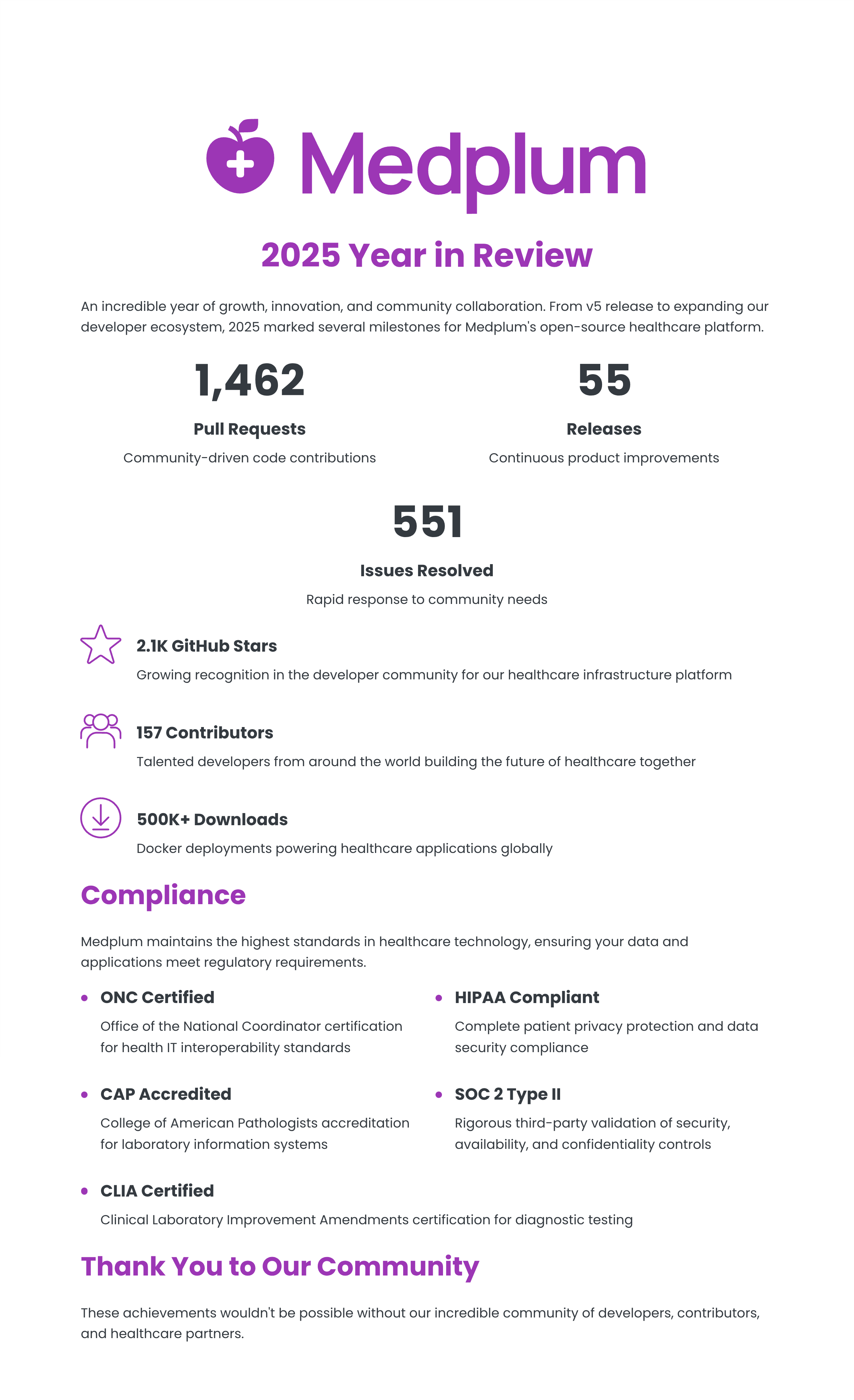Medplum Year in Review 2025

An incredible year of growth, innovation, and community. From v5 release to expanding our developer ecosystem, 2025 marked several milestones for Medplum's open-source healthcare platform.

An incredible year of growth, innovation, and community. From v5 release to expanding our developer ecosystem, 2025 marked several milestones for Medplum's open-source healthcare platform.
We are pleased to announce the Release of Medplum v5, the next major version of the open source healthcare developer platform.
As outlined in our preparatory post in May, Medplum v5 represents a comprehensive and necessary modernization of our core stack. This release ensures our platform maintains the highest standards of performance, security, and developer experience by aligning with the latest stable versions of our critical runtime and tooling dependencies.
Medplum has become one of the first platforms to achieve certification for the Hub role in the Integrated Reporting Applications (IRA) IHE Profile, marking a milestone in radiology workflow interoperability. This certification positions Medplum as a central orchestrator for real-time synchronization between radiology applications, addressing one of healthcare's most persistent challenges: fragmented diagnostic workflows.
The IRA profile, published in October 2023 by Integrating the Healthcare Enterprise (IHE), represents a transformative approach to radiology interoperability. Built on FHIRcast 3.0.0 and FHIR R5 standards, IRA enables different applications—from PACS systems to AI tools—to share context and content seamlessly during diagnostic reporting. For Medplum, certification as a FHIRcast Hub means our platform can now coordinate complex radiology workflows where multiple applications must work together in harmony.
Healthcare APIs need flexibility. While FHIR's standard CRUD operations (create, read, update, delete) handle most use cases, real-world healthcare workflows often require custom logic that goes beyond basic data manipulation. That's why we're excited to introduce custom FHIR operations in Medplum.
FHIR operations are the "dollar sign things" – endpoints like $validate, $expand, or $match that perform specialized functions beyond standard CRUD operations. These are technically called "operations" in FHIR terminology, distinct from the basic "interactions" used for everyday data management.
Medplum is the platform of choice for technical leaders in healthcare, and that has given us a unique perspective into the transformative power of AI in healthcare - we get asked about it every single day.
We know that technical leaders feel the pressure to define and execute on an AI strategy, and to demonstrate tangible progress to teams and stakeholders, that's expected in times of rapid technical advances.
That's why we're thrilled to announce our beta support for Anthropic's Model Context Protocol (MCP), marking a significant leap forward in how large language models (LLMs) can securely and intelligently interact with healthcare infrastructure and systems of record.
Healthcare technology relies on established systems like Electronic Health Records (EHRs) and is now incorporating concepts like Unified Digital Health Platforms (UDHPs). Understanding this evolution is key to navigating the industry's direction.
Forking can look like the fastest path to control, but it often becomes a long‑term maintenance tax. Here’s a pragmatic checklist to decide—and alternatives that usually win.
As the open source healthcare developer platform of choice for innovators worldwide, Medplum continues to evolve with the rapidly changing technology landscape. We're excited to announce our upcoming major version release, Medplum v5, scheduled for October 2025. This post outlines the significant changes coming in this release to help our users prepare accordingly.
Andrei Zudin is a healthcare interoperability expert and advisor to the Medplum community. He is the former CTO and co-founder of Health Gorilla.
A Technical Guide to TEFCA Integration for Software Developers and Health IT Professionals (Download as PDF)
This white paper aims to provide a technical guide for software developers and healthcare IT professionals seeking to integrate their systems with the Trusted Exchange Framework and Common Agreement (TEFCA). It delves into the technical aspects of TEFCA, including the various participation models, QHIN connectivity, data exchange methods, and security considerations. It also explores the incentives for TEFCA participation and how Medplum can help organizations achieve TEFCA compliance and leverage its benefits.
Modern Healthcare Integration in the Wake of NextGen's Announcement
This week, NextGen Healthcare announced that Mirth Connect, the healthcare integration engine that has been a cornerstone of interoperability for countless organizations, will no longer be available. As long-time healthcare integration engineers ourselves, we recognize this news creates significant uncertainty for the many organizations that rely on Mirth Connect for critical healthcare workflows.